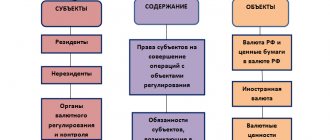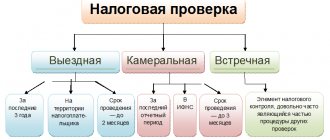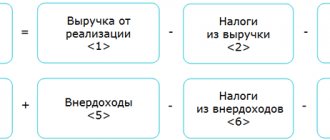The interaction of enterprises with government agencies involves carrying out various control measures - from registering taxpayers to accepting reports and carrying out audits. Which bodies have the right to carry out such actions and in relation to what resources? Let's take a closer look at what the subjects of tax control are in the Russian Federation.
Purpose of tax control
The purpose of tax control is to prevent and identify tax offenses (including tax crimes), as well as to bring to justice persons who have violated tax laws.
The goals of tax control are realized by solving certain tasks:
- ensuring the economic security of the state during the formation of public centralized and decentralized monetary funds;
- ensuring proper control over the formation of state revenues and their rational use;
- improving interaction and coordination of the activities of control bodies in the Russian Federation;
- checking the fulfillment of financial obligations to the state and municipalities by organizations and individuals;
- checking the intended use of tax benefits;
- suppression and prevention of offenses in the tax sphere.
Subjects and objects of tax control
Administration of tax transactions is considered an important part of financial and government control over the activities of business entities. The activities carried out are aimed at checking the correctness of compliance with legislative norms - the assessment of taxes, fees and other mandatory payments by enterprises; completeness of transfer of funds to the budget; legality of using benefits, etc. Tax control is regulated in accordance with the requirements of Chapter 14 of the Tax Code.
According to paragraph 3 of Art. 82 Tax Code participants of tax control are:
- Tax authorities.
- ATS.
- Customs.
- Investigative structures.
- Management bodies of state extra-budgetary funds.
- Controlled taxpayer companies.
- Supporting parties.
The main goal of tax control is to identify and prevent violations in the field of taxation, ensuring the legality of the financial and economic activities of legal entities and individuals, including entrepreneurs. In a general sense, the object of tax control is the legal relationship in the field of taxation of the reporting entity regarding the fulfillment of its obligations provided for by the legislation of the Russian Federation in terms of their legality, completeness, timeliness and reliability.
Taking into account the above, the objects of tax control are:
- Taxpayers' monetary resources and their movement.
- Labor resources.
- Material and other resources.
Note! Clause 4 art. 82 prohibits the collection, subsequent storage, and distribution of any information obtained during control activities in violation of the norms established by the legislation of the Russian Federation, including violation of data confidentiality requirements.
Forms of tax control
Tax control is implemented through the procedural activities of tax authorities, the basis of which is justified specific techniques, means and methods used in the implementation of control functions.
A form of tax control is a way of concretely expressing and organizing control actions.
Tax control is carried out by officials of tax authorities within their competence through tax audits, obtaining explanations from taxpayers, tax agents and fee payers, checking accounting and reporting data, inspecting premises and territories used to generate income (profit), as well as in other forms, provided for by this Code.
At the same time, when exercising tax control, the collection, storage, use and dissemination of information about the taxpayer (payer of the fee, tax agent) obtained in violation of the provisions of the Constitution of the Russian Federation, the Tax Code of the Russian Federation, federal laws, as well as in violation of the requirement to ensure confidentiality is not allowed information constituting the professional secret of other persons, in particular attorney-client secret, audit secret.
Tax control measures: basic rules of the Tax Code of the Russian Federation and nuances determined by judicial practice
November 26, 2022 3:15 pm
Income and expenses of a lawyer, as well as documents related to the calculation of taxes, are not attorney-client privilege.
On November 26, as part of the FPA RF webinar, Marina Stepanova, Chief Manager of the Tax Department of PJSC MMC Norilsk Nickel, discussed the topic of tax control. She covered tax control activities carried out by tax authorities, spoke about tax crimes, subjects and objects of tax control, its forms and methods.
The speaker paid special attention to tax audits as the main activities of tax control, identifying the key points of conducting desk and on-site tax audits and highlighting the criteria used by tax authorities in the process of selecting organizations to conduct on-site tax audits. Speaking about this, Marina Stepanova opened up the topic of requesting documents and information as part of on-site and desk tax audits, listing the features of requesting documents outside the scope of inspections.
As a general rule, the period for a desk audit cannot be more than three months from the date of submission of the tax return and tax calculations. An exception is VAT: a desk audit of a VAT return lasts two months, and in some cases can be extended. At the same time, violation of the deadline for conducting an audit, according to the courts, is not grounds for canceling the decision of the tax authority. If a taxpayer updates his tax return several times, each document may be subject to a separate audit. Carrying out a repeated desk tax audit of a declaration that has already been subject to control is unlawful - this is enshrined in the Ruling of the Constitutional Court of the Russian Federation of April 23, 2015 No. 736-O.
In addition, the emphasis in the online presentation was on a relatively new form of tax control – tax monitoring. The speaker examined the features of tax monitoring, the possibility of obtaining a reasoned opinion from the tax authority and the nuances of the mutual agreement procedure directly provided for in Art. 105.31 of the Tax Code of the Russian Federation.
Marina Stepanova told what regulations and explanations from tax authorities lawyers should know. According to her, many tax issues are now regulated by letters from the Federal Tax Service of Russia, as well as judicial practice.
The lecturer drew special attention of the webinar participants to cases of taxpayer refusal to submit documents requested by the tax authority. First of all, the answer to the question is interesting: can a lawyer be held accountable if he refuses to provide information constituting attorney-client privilege? If the documents are directly related to the determination of the lawyer’s income and expenses and to the calculation of taxes that the lawyer must pay, then the tax authority has the right to request them. This issue was resolved by the Constitutional Court of the Russian Federation back in 2008 (Definitions of the Constitutional Court of the Russian Federation No. 449-O-P of March 6, 2008 and No. 451-O-P of June 17, 2008). The same applies to lawyer education. Therefore, it is necessary to exercise due diligence when deciding to refuse the tax authority in order to avoid being subject to its sanctions.
These decisions of the Constitutional Court of the Russian Federation also indicate that the resolution of disputes about “whether the document requested from the lawyer contains information constituting attorney-client privilege, or whether it refers to documents that are related to the assessment of the tax consequences of transactions concluded by the lawyer with his clients, i.e. . reflect his own income and expenses, and therefore can be subject to verification in the usual manner, falls within the competence of law enforcement agencies” and does not fall within the powers of the Constitutional Court of the Russian Federation.
In conclusion, the lecturer provided interesting statistics on the results of the control work of the tax authorities of the Russian Federation for 2022.
At the end of her speech, Marina Stepanova answered questions from the webinar audience.
The speaker's presentation can be found here.
Please note that the recording of the webinar will be available on November 26 until 24.00 (Moscow time). Replays will take place on November 27 and 28.
Konstantin Katanyan
SharePrint Direct link to the material:
Share
Rights of tax authorities when exercising tax control
Forms of tax control consist of the rights of tax authorities established by the Tax Code of the Russian Federation:
- require from the taxpayer or tax agent documents in the forms established by state bodies and local governments, which serve as the basis for the calculation and payment (withholding and transfer) of taxes, as well as explanations and documents confirming the correctness of calculation and timely payment (withholding and transfer) of taxes;
- to seize documents during tax audits from a taxpayer or tax agent that indicate the commission of tax offenses, in cases where there are reasonable grounds to believe that these documents will be destroyed, hidden, altered or replaced;
- to summon, on the basis of a written notification to the tax authorities, taxpayers, fee payers or tax agents to give explanations in connection with their payment (withholding and transfer) of taxes or in connection with a tax audit, as well as in other cases related to their compliance with tax legislation and fees;
- inspect (examine) any production, warehouse, trading and other premises and territories used by the taxpayer to generate income or related to the maintenance of taxable objects, regardless of their location, and conduct an inventory of property owned by the taxpayer;
- control the compliance of large expenses of individuals with their income;
- attract specialists, experts and translators to carry out tax control;
- call as witnesses and persons who may know any circumstances relevant to tax control;
- create tax posts in the manner established by the Tax Code of the Russian Federation.
Types of tax audits
Of course, tax audits are the most common activity of tax inspectors. Their work is based on field and office events. What is the difference between these types of checks?
Desk tax audits
This is a common form of tax audits for current control. The sequence of actions during desk inspections is regulated by Article 88 of the Tax Code of the Russian Federation. As part of such activities, tax authorities can perform the following actions:
- check declarations, reports and other documents submitted by the taxpayer for errors and inconsistencies;
- establish to what extent the information from these documents corresponds to the information available to the tax authority itself;
- control the correctness of the calculation of the tax base and other arithmetic calculations;
- allow or deny requested tax deductions and benefits.
That is, the main task of a desk audit is to monitor the current activities of the taxpayer based on the documents submitted by him. This type of control does not imply tax inspectors visiting the site, inspecting premises, taking inventory of property, etc.
On-site tax audits
This is a more complex and effective form of tax control over the activities of taxpayer enterprises and tax agents. The procedure for on-site inspections is regulated by Article 89 of the Tax Code. As part of such control, tax inspectors can carry out the following actions:
- travel to the taxpayer’s main place of business;
- inspect the premises and property through which the entrepreneur derives profit;
- carry out an inventory of this property;
- check any documentation related to several types of taxes and fees;
- appoint examinations, attract translators.
Accordingly, an on-site audit is carried out at the taxpayer’s place of business. In exceptional cases, it may be moved to the tax office building.
For your information! An on-site inspection can last from two months to six months. However, inspectors may suspend its progress while they are requesting documents from the taxpayer and other authorities, conducting examinations and translating documents from foreign languages.
Chapter 14. Tax control
GL 14 Tax Code of the Russian Federation
Comments to Chapter 14 of the Tax Code of the Russian Federation
- Article 82 of the Tax Code of the Russian Federation. General provisions on tax control
- Article 83. Registration of organizations and individuals
- Article 84 of the Tax Code of the Russian Federation. The procedure for registering and deregistering organizations and individuals. Taxpayer identification number
- Article 85. Obligations of bodies, institutions, organizations and officials to report to the tax authorities information related to the registration of taxpayers
- Article 85.1. Responsibilities of bodies responsible for opening and maintaining personal accounts in accordance with the budget legislation of the Russian Federation related to taxpayer accounting
- Article 86. Responsibilities of banks related to taxpayer registration
- Article 86.1 of the Tax Code of the Russian Federation. Lost power
- Article 86.2 of the Tax Code of the Russian Federation. Lost power
- Article 86.3 of the Tax Code of the Russian Federation. Lost power
- Article 87 of the Tax Code of the Russian Federation. Tax audits
- Article 87.1 of the Tax Code of the Russian Federation. No longer in effect on January 1, 2004.
- Article 88. Desk tax audit
- Article 89. On-site tax audit
- Article 89.1. Features of conducting an on-site tax audit of a consolidated group of taxpayers
- Article 89.2. Features of conducting an on-site tax audit of a taxpayer who is a participant in a regional investment project
- Article 90 of the Tax Code of the Russian Federation. Witness participation
- Article 91 of the Tax Code of the Russian Federation. Access of tax officials to the territory or premises to conduct a tax audit
- Article 92 of the Tax Code of the Russian Federation. Inspection
- Article 93 of the Tax Code of the Russian Federation. Requesting documents during a tax audit
- Article 93.1 of the Tax Code of the Russian Federation. Request for documents (information) about the taxpayer, fee payer, insurance premium payer and tax agent or information about specific transactions
- Article 93.2. Requesting documents (information) from audit organizations (individual auditors)
- Article 94 of the Tax Code of the Russian Federation. Removal of documents and objects
- Article 95 of the Tax Code of the Russian Federation. Expertise
- Article 96 of the Tax Code of the Russian Federation. Engaging a specialist to assist in tax control
- Article 97 of the Tax Code of the Russian Federation. Translator's participation
- Article 98 of the Tax Code of the Russian Federation. Participation of witnesses
- Article 99 of the Tax Code of the Russian Federation. General requirements for the protocol drawn up during tax control actions
- Article 100 of the Tax Code of the Russian Federation. Registration of tax audit results
- Article 100.1 of the Tax Code of the Russian Federation. The procedure for considering cases of tax offenses
- Article 101 of the Tax Code of the Russian Federation - Making a decision based on the results of consideration of tax audit materials
- Article 101.1 of the Tax Code of the Russian Federation. Lost power
- Article 101.2 of the Tax Code of the Russian Federation. Entry into force of the decision of the tax authority to bring to justice for committing a tax offense and the decision to refuse to bring to justice for committing a tax offense upon appeal to the appeal
- Article 101.3 of the Tax Code of the Russian Federation - Execution of the decision of the tax authority to bring to justice for committing a tax offense or a decision to refuse to bring to justice for committing a tax offense
- Article 101.4 of the Tax Code of the Russian Federation. Proceedings in the case of tax offenses provided for by this Code
- Article 102. Tax secrecy
- Article 103 of the Tax Code of the Russian Federation. Inadmissibility of causing unlawful harm during tax control
- Article 103.1 of the Tax Code of the Russian Federation - Lost force on January 1, 2007.
- Article 104 of the Tax Code of the Russian Federation. Application for collection of tax sanctions
- Article 105. Consideration of cases and execution of decisions on the collection of tax sanctions
‹ Article 81 of the Tax Code of the Russian Federation. Making changes to the tax return, calculationsUp Article 82 of the Tax Code of the Russian Federation. General provisions on tax control ›


